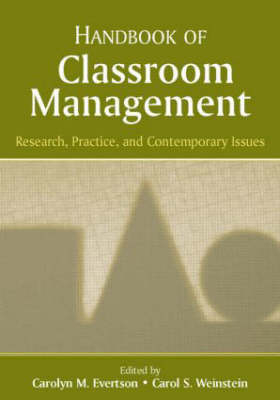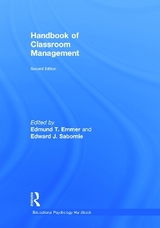
Handbook of Classroom Management
Lawrence Erlbaum Associates Inc (Verlag)
978-0-8058-4753-6 (ISBN)
- Titel erscheint in neuer Auflage
- Artikel merken
Classroom management is a topic of enduring concern for teachers, administrators, and the public. It consistently ranks as the first or second most serious educational problem in the eyes of the general public, and beginning teachers consistently rank it as their most pressing concern during their early teaching years. Management problems continue to be a major cause of teacher burnout and job dissatisfaction. Strangely, despite this enduring concern on the part of educators and the public, few researchers have chosen to focus on classroom management or to identify themselves with this critical field.
The Handbook of Classroom Management has four primary goals: 1) to clarify the term classroom management; 2) to demonstrate to scholars and practitioners that there is a distinct body of knowledge that directly addresses teachers’ managerial tasks; 3) to bring together disparate lines of research and encourage conversations across different areas of inquiry; and 4) to promote a vigorous agenda for future research in this area. To this end, 47 chapters have been organized into 10 sections, each chapter written by a recognized expert in that area. Cutting across the sections and chapters are the following themes:
*First, positive teacher-student relationships are seen as the very core of effective classroom management.
*Second, classroom management is viewed as a social and moral curriculum.
*Third, external reward and punishment strategies are not seen as optimal for promoting academic and social-emotional growth and self-regulated behavior.
*Fourth, to create orderly, productive environments teachers must take into account student characteristics such as age, developmental level, race, ethnicity, cultural background, socioeconomic status, and ableness.
Like other research handbooks, the Handbook of Classroom Management provides an indispensable reference volume for scholars, teacher educators, in-service practitioners, and the academic libraries serving these audiences. It is also appropriate for graduate courses wholly or partly devoted to the study of classroom management.
Contents: Part I: Introduction. C.M. Evertson, C.S. Weinstein, Classroom Management as a Field of Inquiry. J. Brophy, History of Research on Classroom Management. Part II: J. Brophy, Alternative Paradigms for the Study of Classroom Management. T.J. Landrum, J.M. Kauffman, Behavioral Approaches to Classroom Management. M. Gettinger, K.M. Kohler, Process-Outcome Approaches to Classroom Management and Effective Teaching. W. Doyle, Ecological Approaches to Classroom Management. G. Morine-Dershimer, Classroom Management and Classroom Discourse. E. Brantlinger, S. Danforth, Critical Theory Perspective on Social Class, Race, Gender, and Classroom Management. A.W. Hoy, C.S. Weinstein, Student and Teacher Perspectives on Classroom Management. Part III: M. McCaslin, Recent and Emergent Perspectives on Classroom Management. M. McCaslin, A.R. Bozack, L. Napoleon, A. Thomas, V. Vasquez, V. Wayman, J. Zhang, Self-Regulated Learning and Classroom Management: Theory, Research, and Considerations for Classroom Practice. M. Watson, V. Battistich, Building and Sustaining Caring Communities. D.T. Hickey, N.J. Schafer, Design-Based, Participation-Centered Approaches to Classroom Management. M.J. Elias, Y. Schwab, From Compliance to Responsibility: Social and Emotional Learning and Classroom Management. G. Gay, Connections Between Classroom Management and Culturally Responsive Teaching. Part IV: A.W. Hoy, Classroom Management in Specific Contexts. K. Carter, W. Doyle, Classroom Management in Early Childhood and Elementary Classrooms. E.T. Emmer, M.C. Gerwels, Classroom Management in Middle and High School Classrooms. K. Lane, K. Falk, J. Wehby, Classroom Management in Special Education Classrooms and Resource Rooms. L.C. Soodak, M.R. McCarthy, Classroom Management in Inclusive Settings. H.R. Milner, Classroom Management in Urban Classrooms. Part V: J.M. Cooper, Managing the Instructional Formats of Contemporary Classrooms. R.A. Lotan, Managing Groupwork in the Heterogeneous Classroom. C.M. Bolick, J.M. Cooper, Classroom Management and Technology. L.M. Morrow, D.R. Reutzel, H. Casey, Organization and Management of Language Arts Teaching: Classroom Environments, Grouping Practices, and Exemplary Instruction. J.R. Mergendoller, T. Markham, J. Ravitz, J. Larmer, Pervasive Management of Project-Based Learning: Teachers as Guides and Facilitators. Part VI: T.L. Good, Research and Theory With Implications for Classroom Management. K.R. Wentzel, A Social Motivation Perspective for Classroom Management. J. Reeve, Extrinsic Rewards and Inner Motivation. J.M.T. Walker, K.V. Hoover-Dempsey, Why Research on Parental Involvement Is Important to Classroom Management. R.C. Pianta, Classroom Management and Relationships Between Children and Teachers: Implications for Research and Practice. L. Nucci, Classroom Management for Moral and Social Development. Part VII: E.T. Emmer, Programs for Classroom Management and Discipline. H.J. Freiberg, J.M. Lapointe, Research-Based Programs for Preventing and Solving Discipline Problems. S.L. Robinson, S.M. R. Griesemer, Helping Individual Students With Problem Behavior. D. Johnson, R. Johnson, Conflict Resolution, Peer Mediation, and Peacemaking. T.J. Lewis, L.L. Newcomer, R. Trussell, M. Richter, Schoolwide Positive Behavior Support: Building Systems to Develop and Maintain Appropriate Social Behavior. I. Hyman, B. Kay, A. Tabori, M. Weber, M. Mahon, I. Cohen, Bullying: Theory, Research, and Interventions. Part VIII: C.M. Evertson, Teaching and Learning About Classroom Management. V. Jones, How Do Teachers Learn to Be Effective Classroom Managers? L. Stough, The Place of Classroom Management and Standards in Teacher Education. I.A. Friedman, Classroom Management and Teacher Stress and Burnout. K. Fries, M. Cochran-Smith, Teacher Research and Classroom Management: What Questions Do Teachers Ask? B. Larrivee, The Convergence of Reflective Practice and Effective Classroom Management. Part IX: I. Hyman, Policy, Law, Ethics, and Equity. D. Schimmel, Classroom Management, Discipline, and the Law: Clarifying Confusions About Students' Rights and Teachers' Authority. P. Fenning, H. Bohanon, Schoolwide Discipline Policies: An Analysis of the Discipline Codes of Conduct. C. Fallona, V. Richardson, Classroom Management as a Moral Activity. R.J. Skiba, M.K. Rausch, Zero Tolerance, Suspension, and Expulsion: Questions of Equity and Effectiveness. Part X: T. Wubbels, International Perspectives on Classroom Management. A. Miller, Contexts and Attributions for Difficult Behavior in English Classrooms. M. Ben-Peretz, B. Eilam, E. Yankelevich, Classroom Management in Multicultural Classes in an Immigrant Country: The Case of Israel. K. Granström, Group Phenomena and Classroom Management in Sweden. T. Wubbels, M. Brekelmans, P. den Brok, J. van Tartwijk, An Interpersonal Perspective on Classroom Management in Secondary Classrooms in the Netherlands. R. Lewis, Classroom Discipline in Australia. K. Nishioka, Classroom Management in Postwar Japan: The Life Guidance Approach.
| Erscheint lt. Verlag | 8.3.2006 |
|---|---|
| Verlagsort | Mahwah |
| Sprache | englisch |
| Maße | 178 x 254 mm |
| Gewicht | 2223 g |
| Themenwelt | Sozialwissenschaften ► Pädagogik |
| ISBN-10 | 0-8058-4753-7 / 0805847537 |
| ISBN-13 | 978-0-8058-4753-6 / 9780805847536 |
| Zustand | Neuware |
| Haben Sie eine Frage zum Produkt? |
aus dem Bereich



